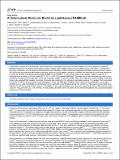A tuberculosis molecular bacterial load assay (TB-MBLA)
Abstract
Tuberculosis is caused by Mycobacterium tuberculosis (Mtb), a pathogen classified by the United Nations (UN) as a dangerous category B biological substance. For the sake of the workers’ safety, handling of all samples presumed to carry Mtb must be conducted in a containment level (CL) 3 laboratory. The TB molecular bacterial load assay (TB-MBLA) test is a reverse transcriptase quantitative polymerase chain reaction (RT-qPCR) test that quantifies Mtb bacillary load using primers and dual-labelled probes for 16S rRNA. We describe the use of heat inactivation to render TB samples noninfectious while preserving RNA for the TB-MBLA. A 1 mL aliquot of the sputum sample in tightly closed 15 mL centrifuge tubes is boiled for 20 min at either 80 °C, 85 °C, or 95 °C to inactivate Mtb bacilli. Cultivation of the heat inactivated and control (live) samples for 42 days confirmed the death of TB. The inactivated sample is then spiked with 100 µL of the extraction control and RNA is extracted following the standard RNA isolation procedure. No growth was observed in the cultures of heat treated samples. The isolated RNA is subjected to real-time RT-qPCR, which amplifies a specific target in the Mtb 16S rRNA gene, yielding results in the form of quantification cycles (Cq). A standard curve is used to translate Cq into bacterial load, or estimated colony forming units per mL (eCFU/mL). There is an inverse relationship between Cq and the bacterial load of a sample. The limitation is that heat inactivation lyses some cells, exposing the RNA to RNases that cause a loss of <1 log10eCFU/mL (i.e., <10 CFU/mL). Further studies will determine the proportion of very low burden patients that cause false negative results due to heat inactivation.
Citation
Sabiiti , W , Mtafya , B A , Alferes De Lima , D , Dombay , E , Baron , V O , Azam , K , Orascova , K , Sloan , D J & Gillespie , S H 2020 , ' A tuberculosis molecular bacterial load assay (TB-MBLA) ' , Journal of Visualized Experiments , vol. 158 , e60460 . https://doi.org/10.3791/60460
Publication
Journal of Visualized Experiments
Status
Peer reviewed
DOI
10.3791/60460ISSN
1940-087XType
Journal article
Description
Funding: European and Developing Countries Clinical Trials Partnership (EDCTP) – Pan African Biomarker Expansion program (PanBIOME) grant SP.2011.41304.008. Support was also obtained the University of St Andrews School of Medicine research grant.Collections
Items in the St Andrews Research Repository are protected by copyright, with all rights reserved, unless otherwise indicated.

